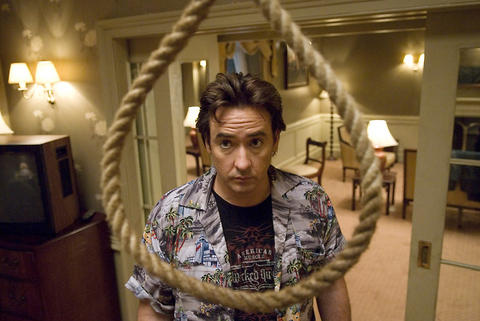A troubled writer, a haunted hotel room - who else but Stephen King? In 1408, adapted from a 2002 short story by King, John Cusack is the hack who drags his emotional baggage to Room 1408 of the Dolphin Hotel in Manhattan, accommodations whose history of grisly deaths demands investigation. Once there, he learns that checking out might not be an option.
Directed by Mikael Hafstrom with old-fashioned restraint and a stylish use of intense close-ups, 1408 is more psychological thriller than outright horror. Recycling many of King's familiar motifs, the story traps its protagonist in an apparitional loop filled with repeating signs of occult infestation: a Carpenters song bursting from a bedside radio, paintings that tilt and transform. The movie is most effective in its early scenes of prickly menace, and while the Dolphin is no Overlook (the haunted hotel in The Shining), its old-world creepiness is exactly right.
King is a writer who excels at finding malevolence in the mundane, and consequently his tortured Everymen have often been more successful on the small screen than on the large. Cusack's character descends directly from David Soul's in Salem's Lot: scarred heroes who have lost their faith. In Cusack's case, it's waiting for him behind the door of 1408.

PHOTOS: COURTESY OF CMC


Last week the story of the giant illegal crater dug in Kaohsiung’s Meinong District (美濃) emerged into the public consciousness. The site was used for sand and gravel extraction, and then filled with construction waste. Locals referred to it sardonically as the “Meinong Grand Canyon,” according to media reports, because it was 2 hectares in length and 10 meters deep. The land involved included both state-owned and local farm land. Local media said that the site had generated NT$300 million in profits, against fines of a few million and the loss of some excavators. OFFICIAL CORRUPTION? The site had been seized

Next week, candidates will officially register to run for chair of the Chinese Nationalist Party (KMT). By the end of Friday, we will know who has registered for the Oct. 18 election. The number of declared candidates has been fluctuating daily. Some candidates registering may be disqualified, so the final list may be in flux for weeks. The list of likely candidates ranges from deep blue to deeper blue to deepest blue, bordering on red (pro-Chinese Communist Party, CCP). Unless current Chairman Eric Chu (朱立倫) can be convinced to run for re-election, the party looks likely to shift towards more hardline

Sept. 15 to Sept. 21 A Bhutanese princess caught at Taoyuan Airport with 22 rhino horns — worth about NT$31 million today — might have been just another curious front-page story. But the Sept. 17, 1993 incident came at a sensitive moment. Taiwan, dubbed “Die-wan” by the British conservationist group Environmental Investigation Agency (EIA), was under international fire for being a major hub for rhino horn. Just 10 days earlier, US secretary of the interior Bruce Babbitt had recommended sanctions against Taiwan for its “failure to end its participation in rhinoceros horn trade.” Even though Taiwan had restricted imports since 1985 and enacted

The depressing numbers continue to pile up, like casualty lists after a lost battle. This week, after the government announced the 19th straight month of population decline, the Ministry of the Interior said that Taiwan is expected to lose 6.67 million workers in two waves of retirement over the next 15 years. According to the Ministry of Labor (MOL), Taiwan has a workforce of 11.6 million (as of July). The over-15 population was 20.244 million last year. EARLY RETIREMENT Early retirement is going to make these waves a tsunami. According to the Directorate General of Budget Accounting and Statistics (DGBAS), the